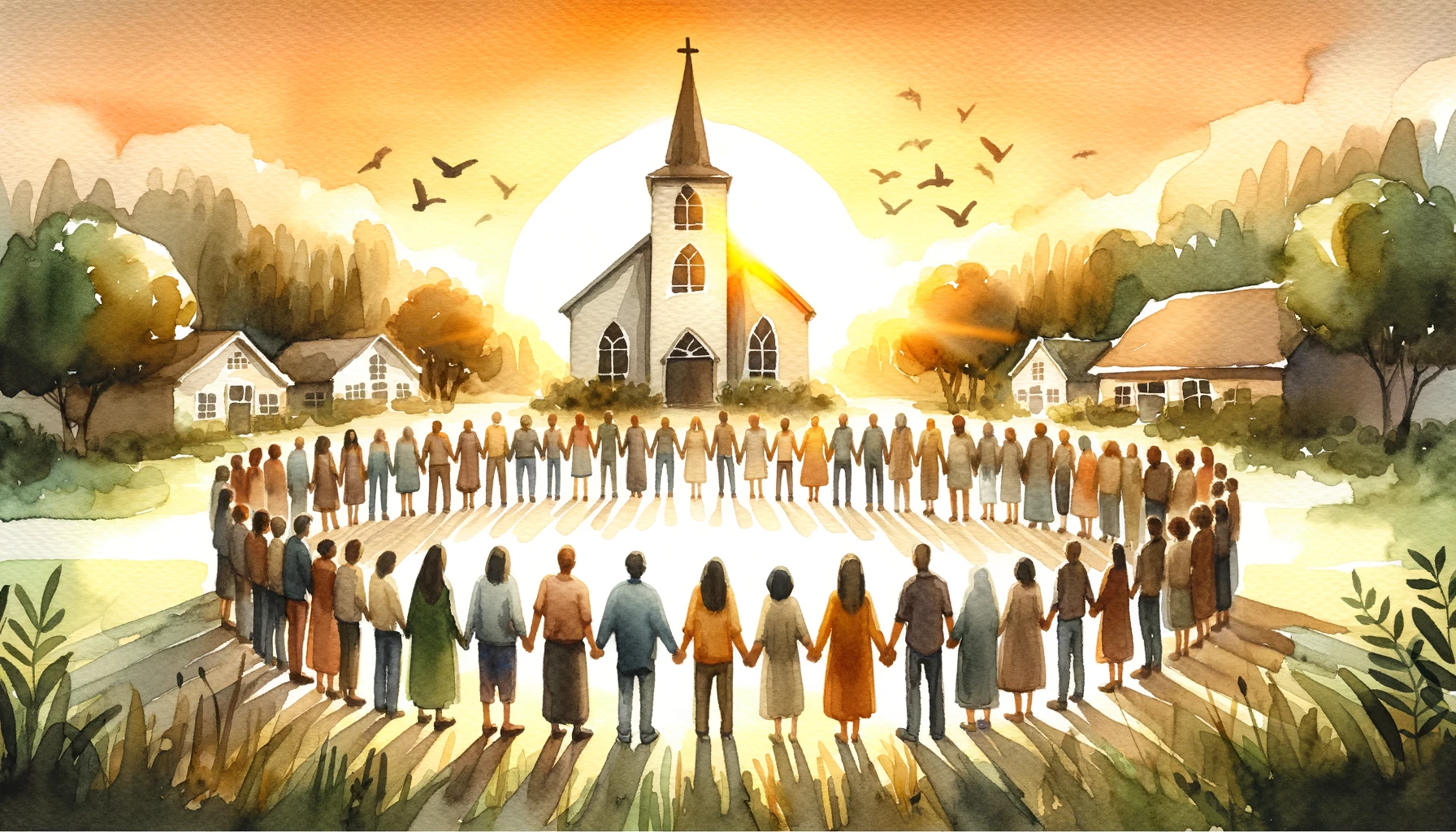Building a vibrant church community is a journey of continuous growth, reflection, and commitment. It is about creating an environment where faith is nurtured, relationships are strengthened, and service is a way of life. Drawing from biblical teachings, we outline nine elements that underscore this quest for vibrancy. These are the cornerstones upon which the foundation of an enduring, enriching Christian community can be laid.
Table of Contents
- The Bedrock of Faith: Worship as a Community Ritual
- The Power of Prayer: Cultivating Personal and Communal Spirituality
- Fellowship: The Key to a Closely-Knit Community
- Mutual Support: The Role of Empathy and Understanding in Unity
- Community Outreach: Extending God’s Love Beyond Church Walls
- Stewardship: The Call to Protect and Nurture God’s Creation
- Nurturing Leadership: Encouraging Servant Leadership in the Congregation
- Teaching and Discipleship: Continuing the Journey of Faith Through Education
- Celebration: Recognizing God’s Grace in Moments Big and Small
- Closing Reflections: Cultivating Wholeness in Our Communities
The Bedrock of Faith: Worship as a Community Ritual
Worship is central to the life of a Christian community. This shared act of reverence and adoration for God not only connects individuals to their Creator, but also binds the community together in a shared spiritual experience. Worship isn’t simply a routine or a ritual; it’s a profound way of expressing our love for God, an act that deepens our understanding of His grace and holiness.
Every worship service, whether it’s a traditional Sunday mass, a midweek prayer meeting, or a special holiday celebration, is an opportunity to glorify God, to praise Him, and to acknowledge His sovereignty. At the heart of worship, we find songs of praise, sermons that offer interpretation and reflection on scripture, and communal prayer. These elements work together to create an environment where individuals can connect with God, learn about His word, and feel His presence in a deeply personal way (Hebrews 10:24-25).
The Power of Prayer: Cultivating Personal and Communal Spirituality
Prayer is an essential part of a vibrant Christian community. It’s the lifeline that connects us to God, allowing us to communicate our hopes, fears, gratitude, and needs. Beyond its role as a personal spiritual practice, prayer also plays a crucial part in the life of the community. It strengthens the bonds between members, encourages empathy, and fosters a shared sense of purpose and direction.
In a Christian community, prayer takes on many forms. It can be a quiet, private conversation with God, a shared prayer during a worship service, or a communal prayer for specific needs within the community or the world at large. It’s in these shared moments of prayer that individuals often find strength, comfort, and encouragement, knowing they are not alone in their struggles or joys (Matthew 18:20).
Fellowship: The Key to a Closely-Knit Community
Fellowship is more than socializing; it’s about nurturing meaningful relationships within the church community. It’s about sharing life together, bearing each other’s burdens, celebrating each other’s joys, learning from each other, and growing together in faith. It’s about creating a space where everyone feels welcomed, accepted, and loved.
In a vibrant Christian community, fellowship happens both formally and informally. It could be through organized church activities, Bible study groups, or simply through shared meals, mutual support during life events, or just spending time together. The essence of fellowship is love, mutual respect, and a shared commitment to journey together in faith. It’s through these deep, meaningful connections that the body of Christ is built up and strengthened, reflecting God’s love for each of His children (Acts 2:42-47).
Mutual Support: The Role of Empathy and Understanding in Unity
In a lively Christian community, mutual support plays a significant role. It’s not just about offering help in times of need, but also about empathizing with others, understanding their struggles, and walking alongside them. It’s about sharing joys, burdens, and experiences, providing encouragement, and strengthening one another in faith.
The spirit of mutual support is truly visible when members of the community step in to assist others in times of crisis, whether it’s a personal tragedy, illness, or any form of hardship. It could also be as simple as lending a listening ear, offering comforting words, or sharing a warm meal. This kind of compassionate, selfless care reflects the commandment to “love your neighbor as yourself”, embodying the very essence of Christian love and unity (Galatians 6:2).
Community Outreach: Extending God’s Love Beyond Church Walls
A vibrant church community doesn’t exist in isolation; it reaches out to the broader community, extending God’s love beyond its own walls. This outreach can take many forms, such as volunteering, social initiatives, or simply acts of kindness towards neighbors and strangers. It’s about embodying Christ’s teachings and extending His love to all people, regardless of their background or circumstances.
Community outreach is a way of living out the Great Commission, to “go and make disciples of all nations”. It’s about showing God’s love in tangible ways, meeting people’s needs, and demonstrating the transformative power of Christ’s love in the world. It’s not just about preaching the Gospel, but also about embodying it in acts of service and compassion (Matthew 28:19-20).
Stewardship: The Call to Protect and Nurture God’s Creation
Stewardship is another essential element of a vibrant Christian community. It’s about recognizing that everything we have – our time, talents, resources, and even the earth itself – is a gift from God, and we are responsible for using these gifts wisely. It’s about taking care of God’s creation, managing our resources responsibly, and using our talents to serve others and glorify God.
Stewardship goes beyond just financial responsibility. It also involves taking care of the environment, advocating for social justice, and using our individual talents and skills for the betterment of the community. It’s about making choices that reflect our gratitude to God for His abundant gifts and our commitment to care for His creation. In practicing good stewardship, we honor God and contribute to the health and vibrancy of our community (Genesis 1:28, 1 Peter 4:10).
Nurturing Leadership: Encouraging Servant Leadership in the Congregation
Leadership in a vibrant Christian community isn’t about power or prestige, but service and humility. The concept of servant leadership, a term coined by Robert K. Greenleaf and deeply rooted in the teachings of Jesus, is key. Servant leaders prioritize the needs of the community over their own, using their skills and influence to nurture, guide, and support others.
These leaders are not just the pastors or elders; they can be anyone within the community who steps up to guide, support, or serve others. They could be leading a Bible study group, coordinating community outreach programs, or simply offering a listening ear to someone in need. This form of leadership fosters a community culture where everyone is encouraged to serve in their own unique ways, contributing to the health and vibrancy of the community as a whole (Mark 10:42-45).
Teaching and Discipleship: Continuing the Journey of Faith Through Education
Teaching and discipleship are vital to the spiritual growth and development of a Christian community. Teaching involves the sharing and exploration of biblical truths, while discipleship is about guiding individuals in their personal journey of faith, helping them to live out these truths in their daily lives.
This process isn’t confined to formal settings like Sunday school or Bible study groups. It can happen in everyday conversations, in acts of service, or in the way community members treat each other. Discipleship is a lifelong journey, and a vibrant community supports its members every step of the way, providing them with opportunities to learn, grow, and deepen their relationship with God (Matthew 28:19-20).
Celebration: Recognizing God’s Grace in Moments Big and Small
Lastly, a vibrant Christian community is marked by a spirit of celebration. Celebration in this context isn’t about lavish parties or festivities; it’s about recognizing and appreciating God’s grace and blessings in our lives. It’s about coming together to express gratitude, joy, and awe for the work of God in our lives and in the world around us.
Celebrations can be for specific occasions, like Easter or Christmas, or they can be for personal milestones, such as baptisms or answered prayers. But they can also be found in the everyday moments, in the shared laughter, in the mutual support, and in the simple act of coming together in fellowship and worship. These moments of celebration serve as powerful reminders of God’s constant presence and boundless love (Psalm 100:1-5).
Closing Reflections: Cultivating Wholeness in Our Communities
These nine elements are not merely components; they weave together to form the vibrant tapestry that is a thriving Christian community. A congregation rooted in worship and prayer, held together by fellowship and mutual support, extending its love through outreach, practicing mindful stewardship, guided by servant leadership, engaged in continuous learning and discipleship, and celebrating God’s grace – this is the picture of a vibrant church.
Reflect on these elements in the context of your own church community:
- How can you contribute more fully to the life and vibrancy of your community?
- In which of these areas does your church shine brightly, and where might there be room for growth?
- How can you personally foster these elements in your own life, and by extension, in your church community?
Our journey towards creating vibrant church communities is a continuous process of growth, reflection, and love. Each step we take, no matter how small, brings us closer to embodying the fullness of Christ’s love in our communities. It’s not about perfection, but about striving to live out the teachings of Jesus in our communal life together. As we strive to cultivate these elements in our communities, we bring to life the beauty, diversity, and richness of the body of Christ. Let us journey together, with joy and hope, as we cultivate communities of faith that shine with the love and grace of God.














